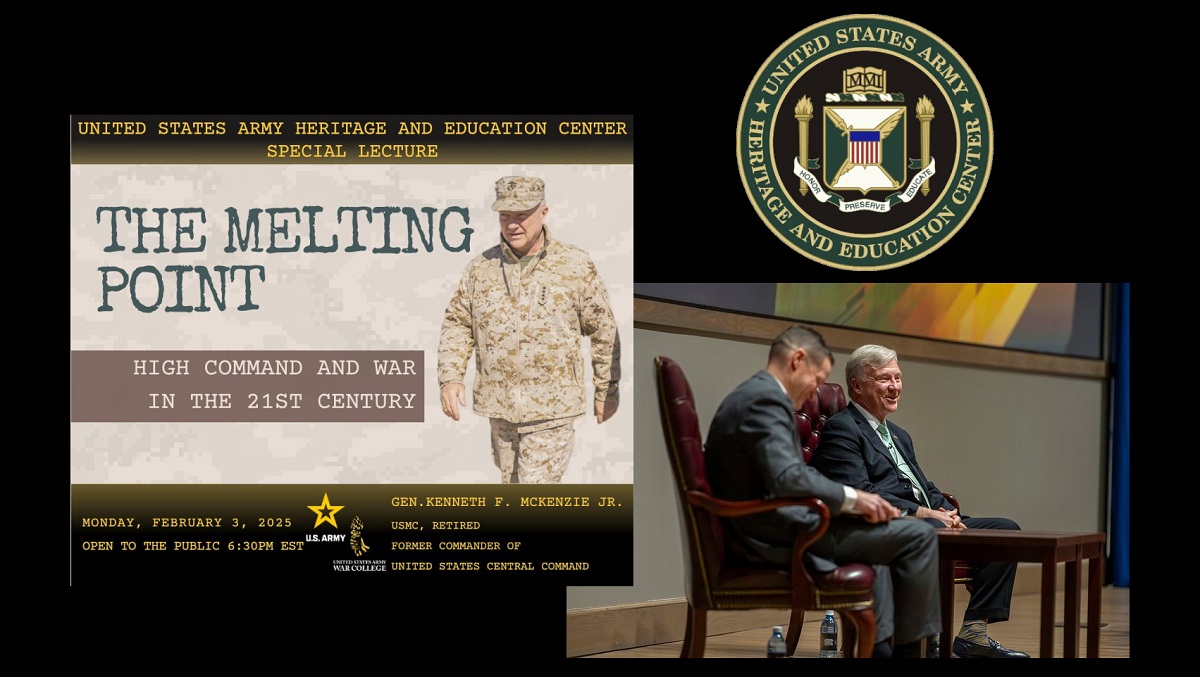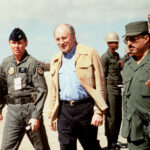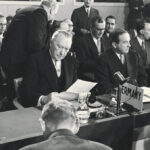
On 3 February 2025, the U.S. Army Heritage and Education Center (USAHEC) hosted the former commander of U.S. Central Command, General Frank McKenzie, USMC, Retired, to discuss his book The Melting Point: High Command and War in the 21st Century. Joined by Tom Spahr on stage they discussed his experience as a combatant commander and the challenges of leadership in wartime. Their conversation emphasized the importance of history and its influence on senior leader decision-making. The presentation examined the drone strike that killed Qasem Soleimani, the Iranian Quds Force commander, the raid that killed ISIS leader Abu Bakr al-Baghdadi, and the withdrawal from Afghanistan and the challenges faced during the evacuation from Kabul.
We left Afghanistan because two American presidents, as unalike as any two presidents in American history, both shared a desire that was to leave, and to leave completely.
The audio for this episode is provided by our friends at USAHEC and the video presentation can be found in its entirety on their YouTube channel.
Learn more about the U.S. Army Heritage and Education Center on their website or follow them on their social media accounts
Podcast: Download
Kenneth Franklin McKenzie Jr. is a retired United States Marine Corps general who served as the 14th commander of the United States Central Command from March 28, 2019 to April 1, 2022. He is the author of The Melting Point: High Command and War in the 21st Century.
Thomas W. Spahr is the DeSerio Chair of Strategic and Theater Intelligence at the U.S. Army War College. He is a retired colonel in the U.S. Army and holds a Ph.D. in History from The Ohio State University. He teaches courses at the Army War College on Military Campaigning and Intelligence.
The views expressed in this presentation are those of the speakers and do not necessarily reflect those of the U.S. Army War College, U.S. Army, U.S. Marine Corps or Department of Defense.
Photo Credit: U.S. Army War College and U.S. Army Heritage and Education Center





What a great podcast!
As part of the title of GEN McKinzie’s book title are the words “War in the 21st Century.”
Question:
a. If the U.S./the West’s political objective in the 21st Century — and, thus, the wars of the U.S./the West in the 21st Century — if these were/are generally about changing the cultures of other states and societies; this, with “enemies” in the 21st Century being understood accordingly:
“Modern wars are often about changing other cultures. While many wars in history were about enrichment and honor, modern wars often pursue goals that aim at the annihilation of certain cultural traits like Prussian militarism after 1945 or the creation of new ones like a democratic way of life. The contemporary American wars of the 2000s are paradigmatic examples for this. In these wars, strategy is the art of implementing enduring cultural change in a foreign culture to further a state’s own interest.” (See the second and third paragraphs of the 2019 Strategy Bridge article “Strategy, War, and Culture: #Reviewing Military Anthropology” by Julian Koeck.)
b. And if U.S./Western states’ “own interest” in the 21st Century (to wit: the reason that we are attempting to achieve enduring cultural change in other countries) might be defined and/or understood somewhat along the following lines:
“Since the 1990s the focus of American international security policy has been focused on creating conditions for extending zones of security and prosperity to other states under the theory that ‘political as well as economic globalization would make the world safer — and more profitable — for the United States.’ Consequently, the United States saw expansion, rather than retraction, of American military presence around the world.” (See the 2016 Second Edition [not the 2010 First Edition] of the book “Exporting Security: International Engagement, Security Cooperation, and the Changing Face of the US Military” by U.S. Naval War College Professor Derek S. Reveron; therein, see the bottom of Page 2 of the Introduction chapter — directly under the heading “Militaries Do More Than Fight Wars.”)
c. Then I wonder if GEN McKinzie, in his book, took the time to reflect on these such important — war in the 21st Century — matters?
1. Note that, as to the matters that I present above,
a. In the 21st Century 1.0 Wars, GEN McKinzie, et. al, fought on the side of those seeking to achieve revolutionary political, economic, social and/or value changes, and fought against “enemies,” thus, that, via various ways and means, sought to stand in the way of — and/or to reverse — these such changes. Whereas,
b. In the 21st Century 2.0 Wars; in these such wars it appears that American generals, etc., will fight on the side of those seeking to halt, and/or to reverse, these self-same such revolutionary political, economic, social and/or value changes and, thus, fight against “enemies” who would stand in the way of these such halting/these such reversing activities.
2. Thus:
a. Whereas in 21st Century 1.0 Wars, the more “conservative” nations (such as Russia) might be seen as America’s enemies, and the more “liberal” nations (such as those in Europe) might be seen as Americas allies,
b. In 21st Century 2.0 Wars it will be the more “liberal” nations (such as those in Europe) who are/will be seen more as America’s enemies, and the more “conservative” nations (such as Russia) who are/will be seen as America’s allies?
(Vice President Vance, yesterday in Munich, taking special, time and care, to explain the Item No. 2b matters that I present above?)
As to first of the three themes of GEN McKinzie’s “Melting Point,” to wit: the primacy of civilian control of the military; as to this such first of GEN McKinzie’s three themes, how do we think that this will hold up; this, for example, when confronted with the 180 degree “about face” matters that I present at Item 2b of my reply-to-comment immediately above?
Answer: No problem at all. Example from earlier: When told to work with and train the conservative/the no-change Afghans, against the liberal/the pro-(communist in this case) change Afghans and Soviets, we did that. When told to work with and train the liberal/the pro-(now democracy and capitalism) change Afghans, and the Russians, against the conservative/the no-change Afghans (who, as noted above, were our allies in our existential conflict with the Soviets/the communists back-in-the-day) we did that.